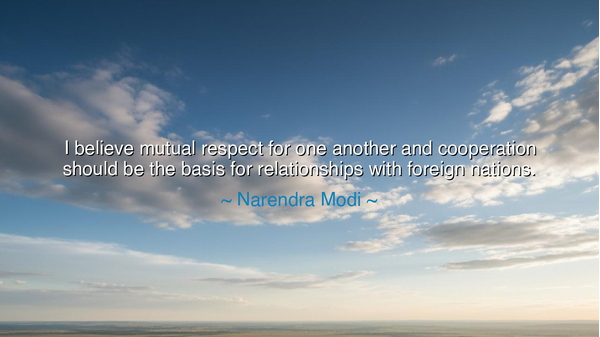
I believe mutual respect for one another and cooperation should
I believe mutual respect for one another and cooperation should be the basis for relationships with foreign nations.






"I believe mutual respect for one another and cooperation should be the basis for relationships with foreign nations." With these words, Narendra Modi speaks to a timeless truth—one that has been the foundation of the most enduring relationships between peoples and nations throughout history. His assertion that respect and cooperation should guide international relations calls upon the wisdom of the ancients, who understood that the strength of any relationship, be it between individuals or empires, lies in mutual recognition of each other’s dignity and value.
In the ancient world, the greatest empires often achieved peace and prosperity not through force alone but through the strength of diplomacy, founded on the principles of respect and cooperation. Take, for example, the Roman Empire, which, at its peak, extended its influence across vast territories. While the Roman legions were formidable, it was the Roman approach to alliances, trade, and respect for the cultures they encountered that ensured long-lasting peace and stability. The Pax Romana, the period of relative peace during the Roman Empire, was not just the result of military might, but also of cooperation with neighboring peoples, honoring their customs, and fostering a spirit of mutual benefit. The ancient Romans understood that the prosperity of one nation could be enhanced through the respectful engagement of others.
In the same vein, the Maurya Empire in ancient India, under the rule of Ashoka, stands as a powerful example of the role of mutual respect and cooperation in forging lasting peace. After a bloody conquest, Ashoka renounced violence and turned toward spreading the message of ahimsa (non-violence) and compassion. He pursued policies of respect for all peoples, fostering diplomacy with neighboring kingdoms and emphasizing the importance of peaceful coexistence. His Edicts of Ashoka, inscribed on pillars across the empire, highlight his belief in the value of respect for human dignity and the importance of cooperation among nations to achieve peace. Ashoka’s reign teaches us that when nations respect each other’s sovereignty and work together in harmony, they pave the way for both individual and collective flourishing.
Modi’s words are a modern echo of this ancient wisdom. Today, the world is more interconnected than ever, yet the challenge of building lasting and peaceful relationships among nations remains. Just as in the days of Ashoka and Rome, respect for one another—respect for different cultures, traditions, and aspirations—must form the foundation of diplomacy. To engage with foreign nations not from a place of superiority but from a place of mutual understanding and cooperation allows for the peaceful resolution of conflicts and the thriving of all parties involved. It is not through the imposition of one nation’s will upon another, but through the recognition of shared interests and the collaborative pursuit of common goals that true peace is achieved.
Consider the example of the United Nations, which was founded after the devastations of the Second World War with the goal of promoting peace through cooperation. While the UN has had its challenges and criticisms, its core mission remains a testament to the power of diplomacy and mutual respect. The fact that nations with vastly different cultures, economies, and political systems sit together in dialogue to work toward common global goals—such as human rights, sustainable development, and conflict resolution—is a modern demonstration of what Modi speaks of. The cooperation among nations, grounded in respect for each other's sovereignty, is the cornerstone of this organization’s continued relevance.
Yet, just as the ancient philosophers often warned about the dangers of arrogance and hubris, so too must we guard against the temptation to see cooperation as weakness or to ignore the dignity of other nations. Kautilya, the ancient Indian scholar and strategist, understood the complexities of international relations in his treatise, the Arthashastra. He argued that while it is important for a nation to protect its own interests, it should do so without undermining the honor of others. He recognized that diplomacy based on mutual respect was far more effective than brute force or coercion. His wisdom suggests that lasting alliances are forged through respect, trust, and equitable cooperation, not through domination or fear.
The lesson for us today is clear: mutual respect and cooperation are the bedrock of not only successful international diplomacy but also personal relationships and community engagement. Whether we are dealing with nations, organizations, or individuals, the principle remains the same: to build meaningful and lasting bonds, we must approach others with respect and a willingness to cooperate. In our globalized world, the call to treat others as equals, to work toward common goals, and to foster mutual understanding is more pressing than ever. Let us remember that true strength lies not in division but in unity, not in imposing our will but in building bridges through respect and collaboration. By embodying these principles in our lives, we can contribute to a world of peace and harmony, where the differences that separate us become the very reasons we seek to understand one another more deeply.






AAdministratorAdministrator
Welcome, honored guests. Please leave a comment, we will respond soon